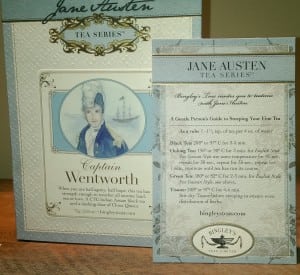Today, I break my self imposed rule against not reviewing teas that are available in markets where they compete with our own, using Douglas Adam’s escape clause in the Hitchhiker’s Guide series, where writers for the Guide may not, under any circumstances, offer a review that is against editorial policy “unless they really, really want to”.
The reason for this is that I wish to right a historic wrong, concerning Ms. Jane Austen.
Many people know her as a writer of biting social commentary; not many people know that she was also a budding tea reviewer. No doubt inspired by tea-fueled contemporaries such as Lord Petersham, she started reviewing tea in earnest. However, her sad death and a mixup after her passing led to her reviews being incorporated into a posthumously edited novel “Persuasion”, instead of being recognised as the cleverly imaginative reviews they are.
In particular, Jane was working on a review of Bingley’s Tea’s Captain Wentworth blend. Of course, it’s all the more impressive that the blend was not created until almost 200 years after her death, but it’s long been said she was ahead of her time, so we should suspend all surprise, disbelief or deeply held conviction that I am making all this nonsense up.
Having recently become acquainted with Jane, I have taken it upon myself to fill in the missing information.
A REVIEW Of BINGLEY’S TEAS “CAPTAIN WENTWORTH”
By Jane Austen and Lord Devotea
Jane very much wished him to meet Captain Wentworth, and there being no sufficient reason against it, we adjudged it a very fine idea.
Upon opening the packet and meeting the Captain, we were assailed with the odour of fresh rain upon the salted timbers of a very kempt ship, and we stilled ourselves to consider the endeavour we were embarking upon.
“There is a momentary expression in Captain Wentworth’s face, a certain glance of his bright eye, and curl of his handsome mouth”, declared Jane, as we brewed the reddish liquor in a fine china teapot. I concurred, although I also suspected a touch of the rogue between the leaves, both large and small, that twisted and turned within their china universe.
And so we drank, and drank again; deeply imbibing the Captain. Jane, was, I think, as far as she might dare to judge from memory and experience, more in love with him; yet there it was not love. It was a little fever of admiration; with eyes of glowing entreaty fixed on her for a time, and it ended all too soon as the last notes of Qimen faded from the memory of our tongues, where the dance of tannin and warmth had so recently culminated.
It was a merry, joyous party, and no one seemed in higher spirits than Captain Wentworth. Jane felt that he had every thing to elevate him which general attention and deference, and especially the attention of all the young women, could do.
The Captain will be welcomed again soon, I am sure. Jane was smitten, although I saw how my own character was considered by Captain Wentworth, and there had been just that degree of feeling and curiosity about me in his manner which must give me extreme agitation.
We are delighted with our new acquaintance, and the visit in general. All that was most agreeable; charming manners in Captain Wentworth, no shyness or reserve; a bold and fearless tea to start one’s day; ready to scale new heights, with renewed energy and capability; invigorated by the Captain, who is a perfect gentleman, unaffected, warm, and obliging.

